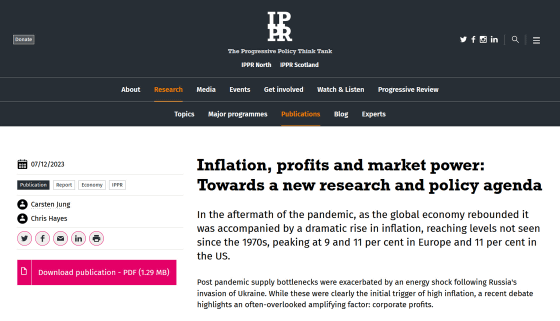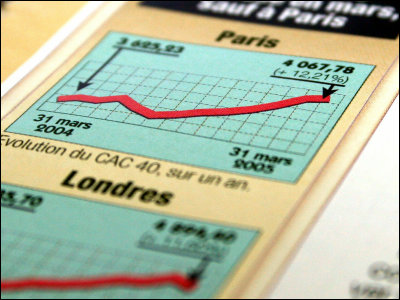Survey results show that common people are suffering from ``greedflation'' where large companies raise prices more than the rise in costs

At the time of writing, historic inflation is accelerating around the world, and a variety of factors have been cited for this, including the new coronavirus infection (COVID-19) pandemic and Russia's invasion of Ukraine. However, research jointly conducted by think tanks
Inflation, profits and market power: Towards a new research and policy agenda | IPPR
https://www.ippr.org/research/publications/inflation-profits-and-market-power

Inflation, Profits and Market Power: Towards a New Research and Policy Agenda | Report | Common Wealth
https://www.common-wealth.org/publications/inflation-profits-and-market-power
Greedflation: corporate profiteering 'significantly' boosted global prices, study shows | Inflation | The Guardian
https://www.theguardian.com/business/2023/dec/07/greedflation-corporate-profiteering-boosted-global-prices-study
As the global economy recovers from the pandemic, inflation rates have risen dramatically, reaching levels not seen since the 1970s of 9% to 11% in Europe and the United States. It has been pointed out that this is due to supply bottlenecks caused by the pandemic and the energy crisis brought about by Russia's invasion of Ukraine, which certainly triggered inflation. However, one aspect that is often overlooked is that ``companies are raising prices in order to hoover up profits.''
According to a report from IPPR and Common Wealth, business profits have risen by 30% for UK listed companies, led by just 11% of large companies with market power. The increase in corporate profits seems to have been even greater in the United States, where most of the economy tends to be controlled by a small number of large corporations.
The act of large companies raising prices beyond the cost increase due to inflation in pursuit of profits is called 'greedflation.' In a highly competitive market, companies may be reluctant to raise prices because it will lead directly to consumer defection; however, if a company already has strong market power, it will be difficult for consumers to leave even if prices are raised, so companies may be reluctant to raise prices. This makes it easier to pursue and raise prices.
The British daily newspaper The Guardian said: ``This surge in profits comes at a time when wage increases have barely kept pace with inflation and workers' disposable incomes have suffered the biggest decline since World War II. He points out that greedflation is one of the causes of hardship in people's lives.

According to the research team, greedflation was particularly seen in companies in sectors such as technology, telecommunications, finance, energy, mining, and food. The report states: 'This exacerbated the initial price increases, as energy and food prices significantly affect costs in all sectors across the economy. This has resulted in higher peaks in inflation and reduced corporate market dominance. 'Inflation lasted longer than it would have if it had been weaker.'
Below is an example of a company that had the highest post-pandemic profits compared to the pre-pandemic average.
ExxonMobil (energy industry): 15 billion pounds → 53 billion pounds (2.7 trillion yen → 9.6 trillion yen)
Shell (energy industry): 16 billion pounds → 44 billion pounds (2.9 trillion yen → 7.95 trillion yen)
Glencore (mining and commodity trading): 1.9 billion pounds → 14.8 billion pounds (340 billion yen → 2.7 trillion yen)
Archer Daniels Midland (grain major): 1.4 billion pounds → 3.16 billion pounds (250 billion yen → 570 billion yen)
Kraft Heinz (food processing manufacturer): 265 million pounds → 1.8 billion pounds (48 billion yen → 330 billion yen)
The researchers pointed out that these large companies were able to maintain or increase their profit margins and generate significant excess profits through a combination of high market power and global market dynamics. 'This has caused significant damage to the global economy. If the market power of corporations had not increased, global GDP (gross domestic product) could have been 8% higher than it is today. The dominance of large corporations. Compared to a world where economic growth was weaker, the real world now has significantly lower worker incomes, less economic dynamism, fewer consumer choices, lower product quality, and fewer economic opportunities. said.

Related Posts:
in Note, Posted by log1h_ik







